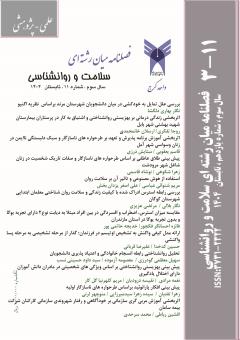اثربخشی آموزش برنامه پذیرش و تعهد بر طرحواره های ناسازگار و سبک دلبستگی ناایمن در زنان وسواسی شهر آمل - قاسم یعقوبی / ستایش درزی
محورهای موضوعی : علوم سلامت و روانشناسیستایش درزی 1 , قاسم یعقوبی 2 *
1 - دانشجو
2 - دانشگاه ایت اله املی
کلید واژه: برنامه پذیرش و تعهد, طرحواره های ناسازگار, سبک دلبستگی ناایمن, وسواس.,
چکیده مقاله :
هدف از پژوهش حاضر بررسی اثربخشی آموزش برنامه پذیرش و تعهد بر طرحواره های ناسازگار و سبک دلبستگی ناایمن در زنان وسواسی بود. روش پژوهش حاضر، نیمه آزمایشی با طرح پیش آزمون_ پس آزمون با گروه کنترل بود. جامعه آماری این پژوهش کلیه زنان وسواسی شهر آمل در سال 1402 بودند. نمونه آماری در این پژوهش شامل 30 نفر از كودكان مبتلا به اختلال بيش فعالي (15نفر برای گروه کنترل و 15 نفر برای گروه آزمایش) که به شیوه نمونه گیری در دسترس انتخاب و به صورت تصادفی ساده در دو گروه جایگزین شدند. ابزارگرد آوری دادها پرسشنامه طرحواره های ناسازگار یانگ و پرسشنامه سبک دلبستگی هازن و شيور بود. تجزیه و تحلیل داده ها با استفاده از نرم افزار spss نسخه 26 انجام شد. در این پژوهش برای تجزیه و تحلیل داده های بدست آمده و برای بررسی همه فرضیه ها و تعیین تاثیر مداخله بر روی گروه آزمایش و ارزیابی تفاضل نمرات دو گروه در فاصله پیش آزمون و پس آزمون از تجزیه و تحليل کوواريانس چند متغیره (MANCOVA)، استفاده شد. یافته ها ی پژوهش نشان داد که آموزش برنامه پذیرش و تعهد بر طرحواره های ناسازگار و سبک دلبستگی ناایمن در زنان وسواسی تاثیر مثبت وجود دارد.
The purpose of this research was to investigate the effectiveness of the acceptance and commitment training program on maladaptive schemas and insecure attachment style in obsessive women. The method of the current research was semi-experimental with a pre-test-post-test design with a control group. The statistical population of this research was all the obsessive women of Amol city in 2024. The statistical sample in this research includes 30 children with hyperactivity disorder (15 for the control group and 15 for the experimental group) who were selected by available sampling method and replaced in two groups in a simple random manner. Entry criteria: 1_ age range of 25 to 35 years old 2_ satisfaction with participation in tests 3_ no history of other psychological disorders 4_ no use of concurrent treatments. Exclusion criteria: 1_ Age above 35 years and below 25 years 2_ They can withdraw from the research when they wish. 3_ Having another mental disorder 4_ Using simultaneous treatments. Data collection tools were Yang's maladaptive schemas questionnaire and Hazen and Shiver's attachment style questionnaire. Data analysis was done using spss software version 26. In this research, multivariate analysis of covariance (MANCOVA) was used to analyze the obtained data and to examine all hypotheses and determine the effect of the intervention on the experimental group and to evaluate the difference in the scores of the two groups in the pre-test and post-test interval. became.
احمدی، اکرم.، قائمی، ف.، و فرخی، ن. (1397). اثربخشی آموزش ذهن آگاهی و درمان مبتنی بر تعهد و پذیرش بر درماندگی روانشناختی، اضطراب مرگ بیماران مبتلا به سرطان اصفهان. مجله علوم روانشناختی، 72(17): 956_951.
انجمن روانپزشکی امریکا. (1402). راهنمای تشخیصی و آماری اختلالات روانی، ویراست پنجم، ترجمه یحیی سید محمدی، تهران: نشر روان. (تاریخ انتشار به زبان اصلی، 2023).
ایزدی، راضیه و عابدی، محمدرضا. (1402). درمان مبتنی بر پذیرش و تعهد، تهران، انتشارات جنگل.
حکمتی، عیسی و بخشی پور، عباس. (1396). خاستگاه فلسفی نظری و مدل آسیب شناختی روانی درمان پذیرش و تعهد، مجله بازتاب دانش، دوره10، ش66، ص 14_25.
صفری، سینا و غضنفری، فیرزوه. (1397). اثربخشی درمان مبتنی بر پذیرش و تعهد بر اضطراب مرگ زنان مبتلا به اماس شهر خرمآباد. مجله بالینی پرستاری و مامایی. ۱۳۹۷; ۷ (۴) :۲۴۱-۲۳۴.
فلکسمن، پل، ا. ، بلک لج، ج. ت. و باند، فرانک. (1402). تندآموز درمان مبتنی بر پذیرش و پای بندی، ترجمه مصلح میرزایی و سامان نونهال،، تهران، نشر کتاب ارجمند.
کاپلان، هارولد و سادوک، بنيامين. (1402). خلاصه روانپزشکی-علوم رفتاری، روانپزشکی بالینی. جلد دوم. ترجمه حسن رفیعی و خسرو سبحانیان. تهران: انتشارات ارجمند. (تاریخ انتشار به زبان اصلی، 2022).
گل محمدیان، محسن؛ رشیدی، علی رضا؛ پروانه، آذر. (1397). اثربخشی آموزش مبتنی بر پذیرش و تعهد بر تنظیم شناختی هیجان و باورهای خودکارآمدی در دانشجویان دختر. فصلنامه روان شناسی تربیتی، 13(47)، 1-23.
میرزائی، زینب، زرگر، یداله و زندی، آرش. (1399). اثربخشی درمان مبتنی بر پذیرش و تعهد بر اضطراب مرگ و سلامت روان زنان مبتلا به ایدز شهر آبادان. مجله روانپزشكي و روانشناسي باليني ايران. ۲۵ (۱):۱۳-۲
هاديان، مريم. (1398). اثربخشي درمان پذيرش و تعهد بر اختلال اضطراب جدايي كودكان مبتلا به ديابت نوع يك. مجله علوم پزشكي رازي، 24، 164، 21_33.
Beck A T. (2022). Anxiety disorders and phobias: A cognitive perspective. New York: Basic Books.
Bretherton I, Munholland KA. (2022). The internal working model construct in light of contemporary neuroimaging research. In: Cassidy J, Shaver PR, editors. Handbook of attachment: Theory, research, and clinical applications.New York: Guilford.
Collins NL. (2018). Adult attachment styles, perceived social support and coping strategies. Journal of Social and Personal Relationships; 15(3):323–45.
Clark, D. A. (2018). New perspectives for a cognitive theory of obsessions. Australian psychologist; 28(1), 101-67.
Hayes SC. (2016). Acceptance and commitment therapy, relational frame theory, and the third wave of behavioral and cognitive therapies. Behavior Therapy. 35: 639-665.
Hazan, C., & Shaver, P. (2022). Romantic love conceptualized as an attachment process. Journal of Personality and Social Psychology, 52, 511-524.
Hayes, S. C., Levin, M. E., Plumb-Vilardaga, J., Villatte, J. L., & Pistorello, J. (2022). Acceptance and commitment therapy and contextual behavioral science: Examining the progress of a distinctive model of behavioral and cognitive therapy. Behavior therapy, 44(2), 180-198.
Halliburton, AE, & Cooper LD. (2022). Applications and adaptations of Acceptance and Commitment Therapy (ACT) for elderly. Context Behavor;4(1):1-11.
Hoffmann D, Halsboe L, Eilenberg T, Jensen JS, Frostholm L. (2018). A pilot study of processes of change in group-based acceptance and commitment therapy for health anxiety. J Contextual Behav Sci; 3(3):189-95.
Glick, D. M., Millstein, D. J., & Orsillo, S. M. (2019).A preliminary investigation of the role of psycho-logical inflexibility in academic procrastination. Journal of Contextual Behavioral Science, 3, 81-88.
Montgomery‚ D.‚ (2020). The Effects of Acceptance and Commitment Therapy on Parents of Children Diagnosed with Autism. Walden Dissertations and Doctoral Studies.
Ossman, WA, Wilson KG, & McNeill JW. (2017). A preliminary investigation of the use of acceptance and commitment therapy in group treatment for social phobia and feeling lonely. Journal of Contextual Behavioral Science. Nov; 6(3):397-416.
Papalia, D. E., Gross, D., & Feldman R. D. (2022). Child development :A topical approach and making . New York: McGraw Hill.
Swain, J., Hancock, K., Hainsworth, C., & Bowman, J. (2019). Acceptance and commitment therapy in the treatment of anxiety: A systematic review. Clinical Psychology Review, 33(8), 965-978.
Thimm, J.C. (2018). Personality and early maladaptive schemas: A five-factor model perspective. Journal of Behavior Therapy and Experimental Psychiatry, 41, 373-380.
Wang, S., Zhou, Y., Yu, S., Ran, L., Liu, X., & Chen, Y. (2023). Acceptance and commitment therapy and cognitive-behavioral therapy as treatment of academic procrastination: A randomized con-trolled group session. Research on Social Work Practice. Published before print: doi.
Yang, J., McCrae, R.R., Costa, P.T., Jr., Dai, X., Yao, S., Cai, T., & Gao, B. (2017). Cross-cultural personality assessment in psychiatric populations: The NEO-PI—R in the people's Republic of China. Psychological Assessment, 11(3), 359-368.
Zhang, D.H., & He, H.L. (2015). Personality traits and life satisfaction: A Chinese case study. Social Behavior and Personality, 38(8), 1119-1122.

